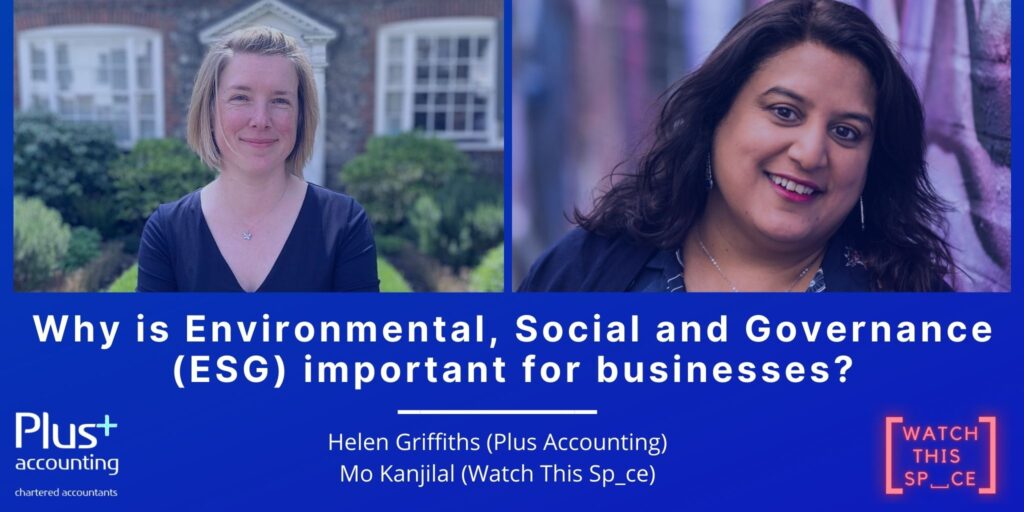There is a lot of commentary currently around Environmental, Social and Governance (ESG) reporting coming from social media, financial press and business institutions. Whilst small and medium-sized entities (SME’s) are not specifically required to report on ESG matters in their annual financial statements or otherwise, we are starting to see some SME’s ask if they can report on the Social aspect of ESG reporting.
In this blog we explore the Social element of reporting; why has it become important to so many, what does ‘Social’ include and how can a business review the social aspect of its operations and communicate what it is doing to its stakeholders?
Mo Kanjilal, one of our Strategic Partners, will explain how her business Watch This Sp_ce can help your business in this area and give her perspective on the changes that are currently occurring.
Why are we seeing more about Social reporting?
Currently SME’s are not required to make any specific statements in their financial statements, or otherwise, about their social responsibilities. However, all company directors, regardless of size, have a general responsibility to “promote the success of the company” and this does mean directors should consider the impact of their decisions, not just on the shareholders, but other stakeholders, such as employees, suppliers, customers and communities.
We are now seeing stakeholders become more vocal about how their community is being affected by companies; employees considering a move place more priority on the social credentials of prospective employers than previously (including their environmental credentials) and suppliers are having to pay more attention to the reputation of those in their supply chain as customers expect better social responsibility.
What does Social reporting include?
There is no one answer to this, and it very much depends on your business. Several reporting frameworks exist for large companies and the focus of these frameworks depend on which stakeholder they are aimed at.
One key message that is emerging is that reporting should be specific to your business and clearly show how your business developed its policies, actioned them and the results.
Social reporting can include topics such as;
- How does your business invest in its employees?
- How do directors and employees communicate? Is there an employee committee? Or periodic meetings for all employees to attend?
- Recruitment and retention policy: how does the business actively ensure a diverse and inclusive workforce?
- Wellbeing: what does the business do to ensure wellbeing of all employees?
- Is there interaction between your company and community? For example, charitable or educational activities with the community.
How to communicate your Social responsibilities
As referred to above, it is key that a business communicates policies to employees and establishes how it is going to measure achievement of that policy. This will make reporting to stakeholders a much easier process because the company will be able to:
- Explain the policy
- Demonstrate how this was disseminated through the business
- Explain what the achievement of the policy look likes
- Report on the results of implementing the policy
Mo Kanjilal from Watch This Sp_ce says:
For diversity and inclusion, there is mandatory reporting on the gender pay gap for companies with over 250 employees. However, we are increasingly seeing companies below that threshold wanting to start tracking their pay gaps. There is currently no legal requirement to report on other pay gaps, but there are campaigners who want to see ethnicity pay gap reporting and other gaps reported so that there is a drive for change.
For companies, it’s about more than that though. To attract and retain employees, showing a commitment to diversity and inclusion is proven to engage people. And it has to be a real commitment. People want to see what actions are being taken, what objectives are being set, what employees say about working at companies, and what social conscience and purpose a company has.
Add to that the strong business case for diversity and inclusion, and you can see why this is something more and more companies are focusing on. Research has shown that inclusive companies generate more innovation, higher profits, make better and quicker decisions, and employees are happier so they stay. This is about the future of businesses. Those who do not think about inclusion will struggle to survive.
We find that often companies do not know where to start, which is why we have developed our Inclusion Audit to help people. We look at:
- People
- Culture
- Engagement
- Performance
- Communication
- Methods
We assess each area and give people a score and an action plan. We help companies to understand where they can start with diversity and inclusion work and how they can drive changes throughout the company. We break this down into an achievable plan and we can then help further with project management, communications and training to make sure the changes actually happen.
And the work is never complete. There is no tick box or form to fill in which means the work is done. People need to be learning and improving all the time to create the inclusive workplaces of the future.
Further reading
The two articles below discuss ESG, the first about the importance of action and not rhetoric and the second about how ESG influences the access your business may have to future employees.
And here is a whitepaper from Watch This Sp_ce about the Inclusivity Imperative.

Author: Helen Griffiths, Accounts and Audit Manager, Plus Accounting
Any views or opinions represented in this blog are personal, belong solely to the blog owner and do not represent those of Plus Accounting. All content provided on this blog is for informational purposes only. The owner of this blog makes no representations as to the accuracy or completeness of any information on this site or found by following any link on this site



